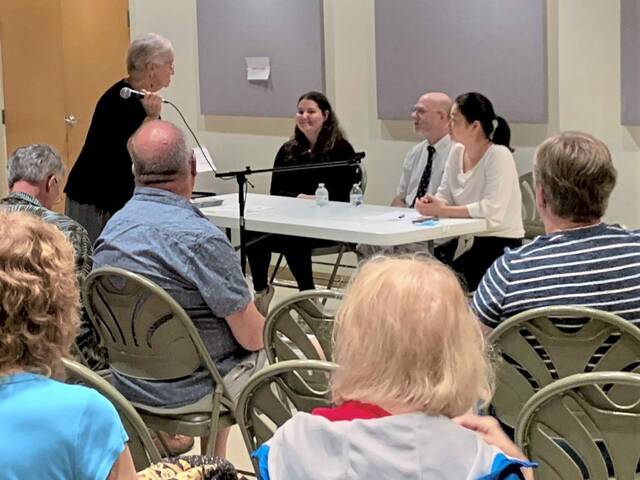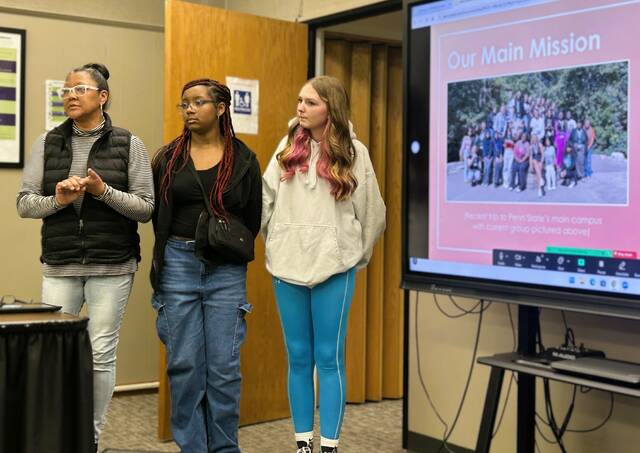Area residents learned about Aging and the Health Brain on Sept. 12 at Monroeville United Methodist Church.
The free educational program was planned by the church’s Adult Ministries Committee and the Health and Wellness Committee. The event focused on the process of healthy brain aging and the mental health challenges that accompany getting older.
Leading presenters were Dr. Howard J. Aizenstein, a geriatric psychiatrist and director of the University of Pittsburgh Geriatric Psychiatry Neuroimaging program, and Dr. Akiko Mizuno, a research instructor in psychiatry, also within the GPN lab. They were accompanied by Brianna Raskin, a senior studying neuroscience at the university.
Jeanette Matthews, chairperson of the Adult Ministries Committee, was able to connect with the doctors through Edythe Eddy, senior research principal at Pitt’s GPN Lab. Joshua Hughes, who chairs the Health and Wellness Committee, also collaborated with Matthews to make this event possible.
“I’ve been involved in a research study for a number of years through the University of Pittsburgh,” said Matthews. “The research has to do with the aging brain. When I became the chair of the adult ministries program, I thought it may be good to have a speaker come and talk about the things that affect a person’s brain as they age and some of the research about it.”
Discussion topics included treatment and prevention methods of dementia, depression and other brain diseases. Resources were provided to people looking for assistance with these challenges.
There was a lot of discussion about Alzheimer’s disease and the GPN Lab’s work to learn more about its origins. The University of Pittsburgh’s GPN Lab is one of 33 Alzheimer’s Disease Research Centers in the United States.
Alzheimer’s disease has many theories regarding its causation, including genetics, lifestyle and age- related changes to the brain. It is often late onset, and researchers have found little relation to genetics.
Aizenstein talked about how the brain ages differently than the body, for a multitude of reasons. Studies have shown that chronic stress or symptoms of it and emotional and physical trauma are able to accelerate brain aging. To combat this, he recommended keeping a balanced diet and balanced sleep schedule, and maintaining social connections.
“Do things that are rewarding and that you enjoy,” he said.
He also spoke about the importance of exercise, which has been proved to grow the hippocampus, a structure in the brain with a major role in learning and memory.
“I think people will benefit greatly from the presentation because number one, a number of us are older, so it will affect us,” said Matthews. “There are a number of us that will be seniors one day, so it will be good for them to be aware of this at a younger age. There are also a number of people that have somebody in their family or friends who are older and may get a better understanding of what that person is going through.”
Presenters delved a little more into magnetic resonance imaging and positron emission tomography in order to take the intimidation out of treatment options. MRIs and PETs have been used in studies for different cognitive conditions. Each has had a critical role in learning effective treatment methods.
The amount of amyloid protein in the brain used to be undetectable until after a person’s death. With advancing research, the protein level is able to be detected using PET scans. Researchers know that a buildup in amyloid in the brain is related to Alzheimer’s but are still unsure of the exact correlation.
“I think this will be very beneficial for all ages,” said Matthews.
The event was open to guests of all ages. Those looking to have a healthy aging brain and those who are supporting others on their journey were in attendance. There was a portion of the event where audience members were free to ask questions and clarify their understanding of the aging brain.
Undergraduate students from the GPN program are hosting intergenerational conversations twice a week. They hold these meetings to increase social interactions and ideas shared between generations. Visit virtualsenioracademy.org for details.
For more information regarding the GPN Lab and its work, visit gpn.pitt.edu.








